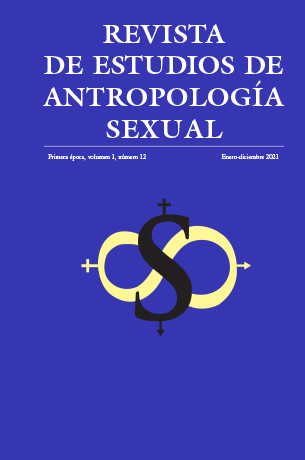Entre el “deber ser” y el “nido vacío”. Modos de envejecer de las lesbianas argentinas
Keywords:
Aging, Old Age, Diversity, Life coursesAbstract
This article reflects on how older lesbians build their old age in their lifetimes. This a qualitative study case and was structured around a core idea: Old age is a social and individual construction and tied to the multiple processes we have throughout our lives. Thus, one of the main characteristics of old age and aging is diversity. Thus, taking into consideration sexual diversity as an element to analyze, this article studies the ways in which Argentine senior lesbians build their old age. In this regard, it will be observed the triple discrimination they suffer: age, for their sexual orientation and for being women, as well as the effects of having to follow certain roles and social mandates associated with the female gender. Qualitative techniques will be used for information gathering, such as life stories to give an account of their trajectories and, therefore recover their memories. At the same time, this will allow us to know the turning points that during their life courses have given them a different kind of old age and this way to build a typology on the characteristics of its aging and old age.
Downloads
References
Agamben, Giorgio, 1998, Quel che resta di Auschwitz. L’archivio e il testimone, Turín, Bollati Boringhieri Editore.
Albarracín, Matilde, 2008, “Libreras y tebeos: las voces de las lesbianas mayores”, en R. Platero (coord.), Lesbianas. Discursos y representaciones, España, Melusina.
Bauman, Zygmunt, 2017, Retrotopía, Buenos Aires, Paidós.
Boudon, R., P. Besnard, M. Cherkaoui y B. Lecuyer, 2012, Dictionnaire de la sociologie, París, Larousse.
Bourdieu, Pierre, 2010a, La dominación masculina, Buenos Aires, Anagrama. ________, 2010b, Meditaciones pascalianas, Buenos Aires, Oxímoron.
Cumming, Elaine y William Henry, 1961, Growing Old: The Process of Disengagement, Nueva York, Basic Books.
Elder, Glen, 1998, “The Life Course and Human Development”, en R.M. Lerner (ed.), Handbook of Child Psychology, vol. 1: Theoretical Models of Human Development, Nueva York, Wiley & Sons, pp. 939-991.
Encarnación, Omar, 2016, Out in the Periphery: Latin America’s Gay Rights Revolution, Nueva York, Oxford University Press.
Eribon, Didier, 2006, Reflexiones sobre la cuestión gay, Barcelona, Anagrama.
Goffman, Erving, 2010, Estigma. La identidad deteriorada, Buenos Aires, Amorrortu.
Kehoe, Monika, 1986, “Lesbians over 65: A Triply Invisible Minority”, Journal of Homosexuality, vol. 12, núms. 3-4, pp. 139-152.
Meccia, Ernesto, 2011, Los últimos homosexuales. Sociología de la homosexualidad y de la gaycidad, Buenos Aires, Gran Aldea.
Neugarten, Bernice, 1970, “Dynamics of Transition of Middle Age to Old Age.
Adaptation and the Life Cycle”, Journal of Geriatric Psychiatry, vol. iv, núm. 1, pp. 71-100. ________, 1996, Los significados de la edad, Barcelona, Herder.
Oliveri, María, 2020, “Envejecimiento y atención a la dependencia en Argentina”, en Banco Interamericano de Desarrollo. Nota técnica No. idb-tn, 2044, noviembre de 2020, https://publications.iadb.org/publications/spanish/document/Envejecimiento-y-atencion-a-la-dependencia-en-Argentina.pdf, consultada el 7 de julio de 2021.
Pecheny, Mario, 2005, “Identidades discretas”, en Leonor Arfuch (comp.), Identidades, sujetos y subjetividades, Buenos Aires, Prometeo, pp. 131-153.
Pollak, Michael, 2006, Memoria, olvido, silencio. La producción social de identidades frente a situaciones límites, Buenos Aires, Ediciones Al Margen.
Rada Schultze, Fernando, 2012, “Sociabilidades homosexuales puestas en perspectiva.
Una mirada sobre el desarrollo de los modos de ser y hacer gay”, Sudamérica. Revista de Ciencias Sociales, vol. 1, núm. 1, pp. 71-96. ________ y Matteo Ingrosso, 2018, “Le coppie lesbiche e gay in Argentina. Riflessioni sull’amore, la famiglia e la sessualità nella terza età omosessuale”, AG About Gender - Rivista internazionale di studi di genere, vol. 7, núm. 14, pp. 22-46.
Raup, J. y J. Myers, 1989, “The Empty Nest Syndrome: Myth or Reality?”, Journal of Counseling and Development, vol. 68, núm. 2, pp. 180-183.
Ricoeur, Paul, 2006, Tiempo y narración. El tiempo narrado, Buenos Aires, Siglo XXI.
Sánchez, Carlos, 2002, “Minorías sexuales y participación política”, en Francisco Vidal y Carla Donoso (eds.), Cuerpo y sexualidad, Santiago de Chile, Universidad Arcis/Flacso, pp. 113-117.
Schwarz, Patricia, 2008, “Las lesbianas frente al dilema de la maternidad”, en Mario Pecheny, Carlos Figari y Daniel Jones (comps.), Todo sexo es político. Estudios sobre sexualidad en Argentina, Buenos Aires, Libros del Zorzal, pp. 193-214.
Downloads
Published
How to Cite
Issue
Section
License
Copyright (c) 2021 Instituto Nacional de Antropología e Historia

This work is licensed under a Creative Commons Attribution-NonCommercial 4.0 International License.



